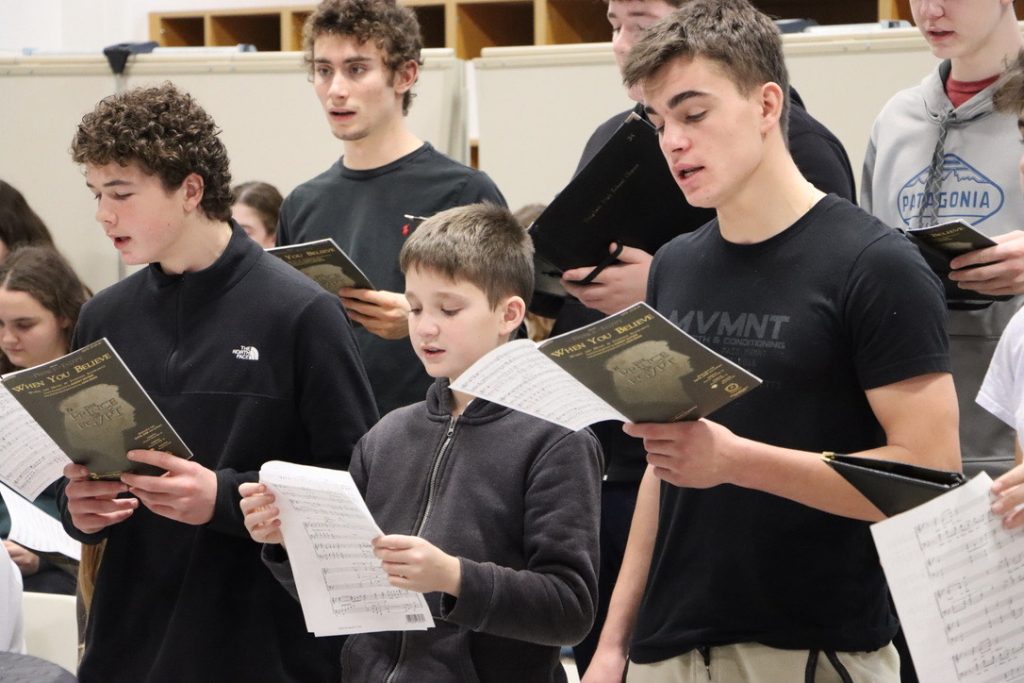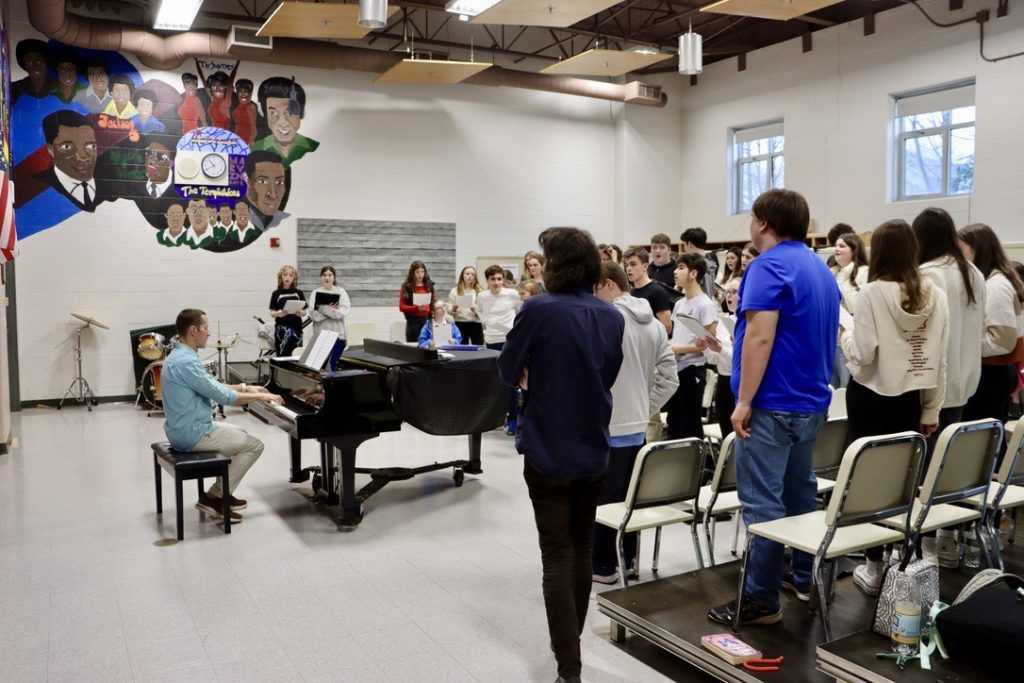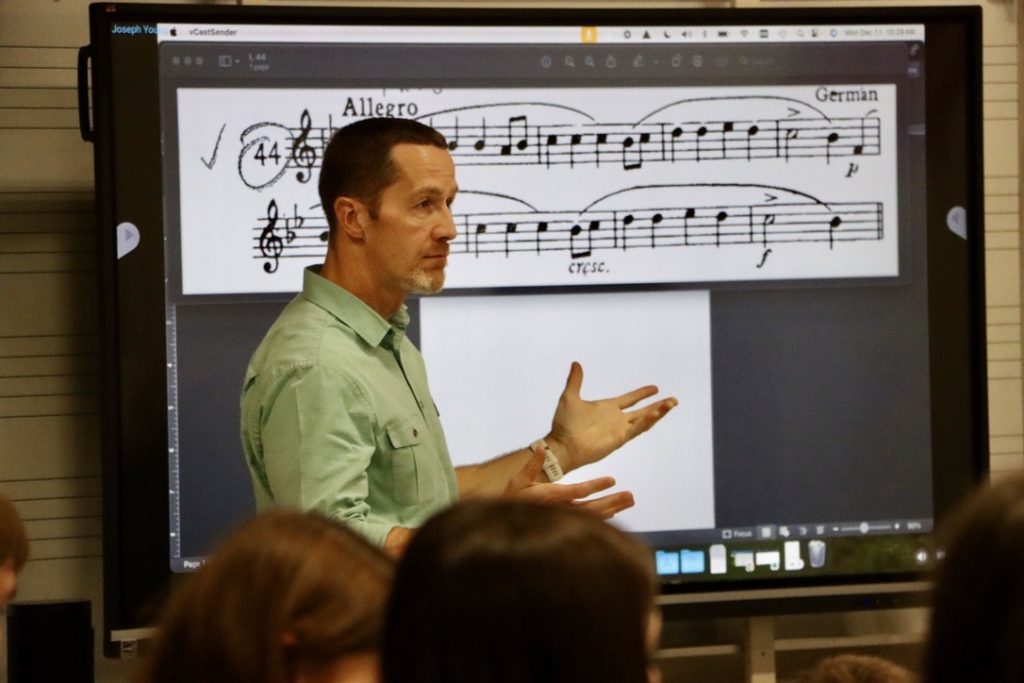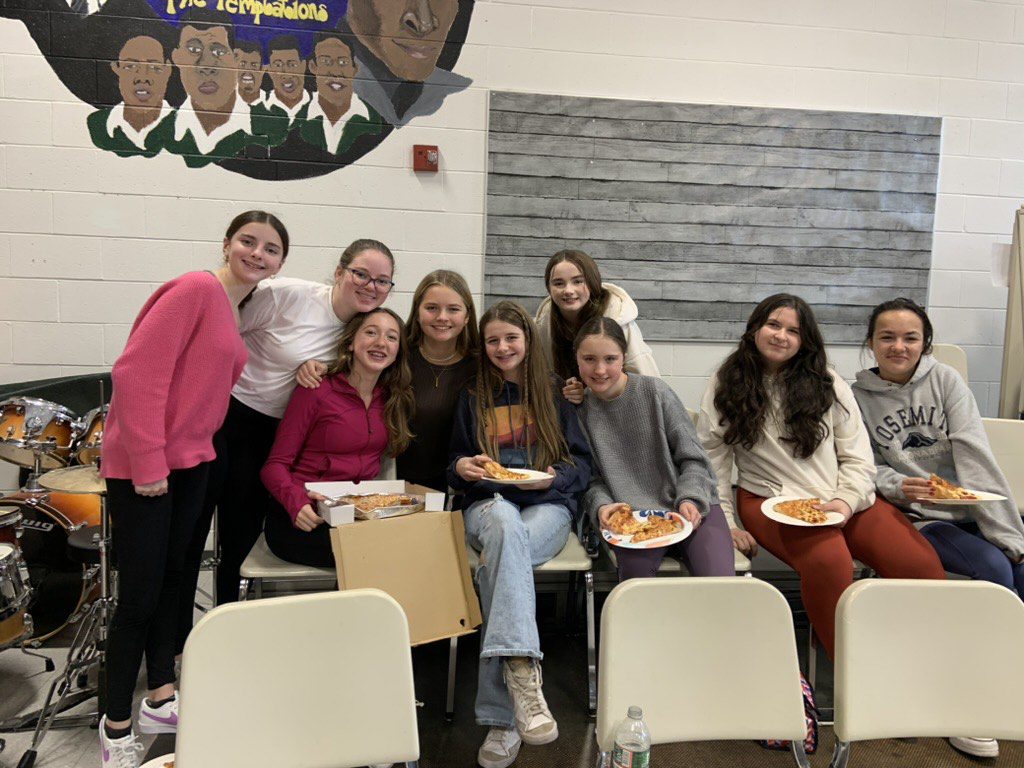
December 21, 2023 By Carol Britton Meyer
Hingham Middle School eighth-grade chorus students spent a day with chorus students at Hingham High recently as part of an effort to inspire them and to help these young singers visualize themselves as part of the HHS chorus program when they move on to ninth grade next year.
The event — led by HMS Chorus Director Christopher Landis and HHS Chorus Director Dr. Joseph Young — included ice breakers and other activities offering a broader perspective on the HHS program — from singing warmups and doing ear training exercises to rehearsing choral music and spending lunchtime together, enjoying pizza provided by the Hingham Music Parents Association.
The students had an opportunity to attend class with high school students during the regularly scheduled chorus period, and Young provided the eighth-graders with an introduction to many of the concepts he teaches at the high school level.
“The students were engaged in a learning experience that will hopefully encourage them to want to continue making music in the future,” Landis told the Hingham Anchor.
His role as the middle school chorus teacher is to encourage students to continue with chorus when they move on to the high school, Landis explained. “Although many of them have been in chorus since fifth grade, enrollment drops significantly at the high school level.”
Firsthand experience
While there has been a similar kind of exchange for several years, this was the first time the middle schoolers visited the high school to experience what the choral program is actually like there, Landis said.
Young — who teaches a group piano class, AP music theory, chorus at the high school, and fourth-grade general music and fifth-grade chorus at East School — described this “shift in strategy” as an opportunity for these eighth-graders “to get a sneak peek” into a day in the life of a high school chorus student. He even provided them with pre-assigned chorus folders as if they were already members of the HHS chorus to help them imagine what it would be like.
“The setting makes all the difference in the world,” he said. “In fact, a high school chorus student told me that she spoke with an eighth-grader after the event who said she hadn’t been planning on taking chorus as a ninth-grader but thinks she will sign up after all.”
Landis explained that Young and he used to trade places “and I would teach the elementary students and he would teach the middle schoolers” at a time when Young taught all of the elementary choirs, he recalled. “While this seemed to work okay, the experience didn’t give the middle school students an opportunity to interact with the high schoolers. It was more focused on the middle school students getting to meet Dr. Young and the elementary students meeting me.”

‘Authentic high school chorus experience’
Since Young had already taught the middle schoolers in elementary school, he and Landis decided it would be better to have the middle school students experience meeting the high school chorus students. “The high schoolers used to come to the middle school, and we would perform for each other. This was the first year we decided to give the middle schoolers an authentic high school chorus experience,” Landis said.
He explained the middle school program and the benefits students reap from participation in the choral program. The middle schoolers do not usually perform in the community. Rather, the sixth-grade chorus, seventh/eighth-grade chorus, and Junior Choral Spectrum (the choral ensembles at the middle school) perform for their families at the typical winter and spring concerts.
“What many people fail to realize is that the music ensembles within our schools also offer a chance for students to ‘find their place,” Landis said. “Many students are looking for some sort of community, and the music ensembles offer that. The ensembles consist of a variety of people with many different interests.”
Oftentimes, a student finds someone with whom he or she can share experiences. “Music is universal,” he said. “We all hear it in different forms and genres; however, it is the one thing that unites us within different cultures and communities.”

‘A musically collaborative setting’
According to Young, any musical ensemble — and in particular, chorus — is an opportunity for people of different life experiences “to come together and use their voices, which is their unique one-of-a-kind instrument in a musically collaborative setting, to express what cannot be expressed in words and to make music with others,” he said.
“This [experience] is in my view reaching something approximating the divine, because when using your voice to make music, you are having to listen to your own voice and how it fits in with everyone around you while also responding to the instruction and queues of the director,” Young continued. “This is a beautiful model for what we as a community should be doing.”
There is a misconception that music is fun, he explained, and that that is its purpose, “but I’m afraid that normally, people who think that way haven’t had the kind of powerful experience that our chorus students have had.”
While music can be fun, ” it’s not just for fun. We need to be searching for something deeper and more meaningful, including developing music literacy skills and sensitivity to the infinite ways the human voice can express an idea,” he said. “That’s very different from entertaining or just having fun. It’s so much more than that — it’s a real skill and craft as well as an art.”

Building connections between middle and high school students
Hingham Public Schools Fine Arts Director Joann Bellis — now in her 13th year working in the HPS district — also shared her thoughts.
“It has been meaningful to see students travel through the entirety of the choral program,” she said. “I have seen the joy and connection that our teachers, Joe Young and Christopher Landis, have been able to inspire through their ensembles, and I am excited by the steps they are taking to build connections between our middle and high school students.”
Young shared that any student in high school who doesn’t feel comfortable with his or her voice as a musical instrument makes him sad.
“It’s almost a human right that they should be able to use their voices in a musically expressive way even if they don’t consider themselves to be musicians,” he said. “There’s a place for everybody — from mainstream athletes and scholars to the marginalized — every kind of kid that walks these halls should seriously consider singing — living life fully.”
Bellis also shared her thoughts about the importance of offering arts programs, including chorus.
“The arts help us better understand ourselves and the world around us,” she said. “Choral programs and the arts, in general, are an essential part of our schools because this is where many students develop their ability to express themselves and to trust their voices. It takes courage and vulnerability to stand up in front of a crowd with only your voice to communicate a message or perspective.”
Covid was challenging for performing ensembles, “as they depend upon human connection and in-person collaboration,” Bellis said. “As a director, I am working with our team to strengthen our arts community by encouraging cross-grade level collaboration, growing community partnerships, and increasing the visibility and celebration of the arts in our schools.”




Great informative article. I ve always valued the HPS music program as a parent, teacher and a Hingham resident.